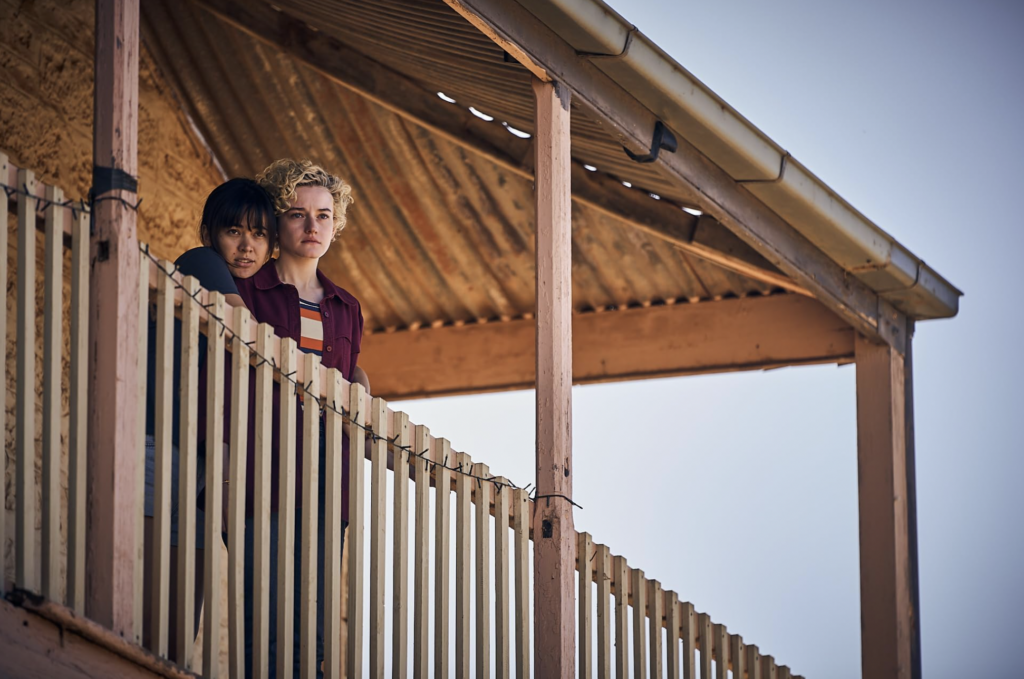★★★★☆
CW: This article references sexual harassment. Please refer to the end of the article for on- and off-campus resources.
As a crowded nightclub with trance-inducing electronic music and disorienting strobe lights comes into view, the audience member has entered “The Royal Hotel.”
The viewer is introduced to Hanna (Julia Garner) and Liv (Jessica Henwick), who are jostled out of their all-night carousing by their declined credit card. In dire need of cash, the two take bartending jobs at The Royal Hotel, a rundown Australian bar in the sweltering outback.
At their new job, the girls deal with disturbing, unwanted advances from the male patrons — mostly miners in an isolated town far from civilization. With no internet access or way out of the town, the situation escalates quickly.
Directed by Kitty Green, the movie explores power imbalances and hierarchies to the extreme — a “Thelma & Louise” (1991) on steroids. The film simmers with increasingly uncomfortable scenes between the two young female protagonists and the boorish, beer-bellied brutes.
As part of their introduction, their boss compliments them, calling them “smart cunts.” The regulars in the bar shout sexual innuendos, excusing their misbehavior by claiming that Hanna and Liv can’t take a joke. The girls consider walking out, but their need for a job and inability to get a ride out of the town tether them to the bar.
They are forced to endure an escalating series of microaggressions that threaten to spill over to outright violence. Green highlights the difficult choice that women face: push back against misogynistic behavior or to be nice and endure the problematic comments.
“The Royal Hotel” has strong cinematography, with well-composed and aesthetically pleasing shots. The use of blue lighting and an ominous droning sound in the background heightens the anxiety and uneasiness of the confrontation.
Green further artfully heightens the tension by making it difficult for the girls to distinguish between perceived and real threats. Patrons write off explosions that erupt outside the bar as firecrackers. When Hanna and Liv are sunbathing, a woman’s scream echoes in the distance, forcing audiences to wonder whether it’s one of fear or passion.
The film forces audiences to question everything. Are the interactions with the patrons considered sexual harassment? As Hanna and Liv get to know locals like Matty, Teeth and Dolly, they experience brief moments of connection. However, the men whip between moments of tenderness to barely restrained aggression. Are they friends or predators? Greene masterfully frames how women have to be aware of potential threats, carefully treading the line between being friendly and giving the “wrong signals.”
“The Royal Hotel” demonstrates that when a person is at the bottom of the power pyramid, it is extremely difficult for them to stand up for themselves. Green also effectively illustrates how fragile these power structures can be: when the bar owner and his wife leave the bar unattended to go to the hospital, the veneer of social order is ripped off, and the conflict between the girls and the townspeople crescendos.
Unfortunately, Green’s ending feels too abrupt. The film ends immediately after the climax without a thoughtful denouement. The ending is also rather simple and unrealistic, in stark contrast to the nuanced exploration of power imbalances and perceived threats in the film.
Overall, “The Royal Hotel” is a film worth seeing. A thought-provoking thriller that reflects the zeitgeist of our post-Me Too times, it offers viewers an important perspective wrapped in an engaging narrative while urging us all to avoid shady bars in the middle of the Australian outback.
Resources: On-campus resources include Health Education Services (202-687-8949) and Counseling and Psychiatric Service (202-687-6985)); additional off-campus resources include the D.C. Rape Crisis Center (202-333-7273) and the D.C. Forensic Nurse Examiner Washington Hospital Center (844-443-5732). If you or anyone you know would like to receive a sexual assault forensic examination or other medical care — including emergency contraception — call the Network for Victim Recovery of D.C. (202-742-1727). To report sexual misconduct, you can contact Georgetown’s Title IX coordinator (202-687-9183) or file an online report here. Emergency contraception is available at the CVS located at 1403 Wisconsin Ave NW and through H*yas for Choice. For more information, visit sexualassault.georgetown.edu.














